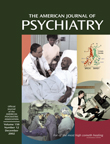New-Onset PTSD After Thalamic Infarct
Mr. A, a 70-year-old Korean War veteran with a history of hypertension, was treated for a pure sensory stroke after a lacunar infarct in the left posterior thalamus. Although his sensory symptoms gradually improved, a year after the stroke he started losing interest in his hobbies and became aloof. However, he reported no other depressive symptoms. Four months later, Mr. A suddenly started experiencing repetitive thoughts about a colleague’s suicide, which he had witnessed in 1953. This colleague, although not Mr. A’s buddy or close friend, had the same rank as Mr. A and shared the same dormitory.Mr. A began feeling anxious and jittery and had difficulty falling asleep. He was startled by the ring of the telephone and began avoiding television programs displaying war scenes. No depressive cognitions, obsessions, flashbacks, delusions, or hallucinations were elicited. His family history was unremarkable, and so was his past psychiatric history, including that for PTSD symptoms, such as reexperiencing, avoidance, or hyperarousal. There was no history of recent trauma or stressors, and he had never thought about this incident before. A repeat cranial computerized tomography scan showed no new findings. Mr. A was diagnosed with PTSD with delayed onset.
References
Information & Authors
Information
Published In
History
Authors
Metrics & Citations
Metrics
Citations
Export Citations
If you have the appropriate software installed, you can download article citation data to the citation manager of your choice. Simply select your manager software from the list below and click Download.
For more information or tips please see 'Downloading to a citation manager' in the Help menu.
View Options
View options
PDF/EPUB
View PDF/EPUBLogin options
Already a subscriber? Access your subscription through your login credentials or your institution for full access to this article.
Personal login Institutional Login Open Athens loginNot a subscriber?
PsychiatryOnline subscription options offer access to the DSM-5-TR® library, books, journals, CME, and patient resources. This all-in-one virtual library provides psychiatrists and mental health professionals with key resources for diagnosis, treatment, research, and professional development.
Need more help? PsychiatryOnline Customer Service may be reached by emailing [email protected] or by calling 800-368-5777 (in the U.S.) or 703-907-7322 (outside the U.S.).

